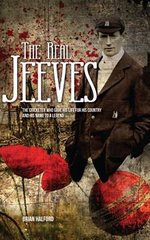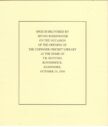The Real Jeeves: The Cricketer Who Gave His Life for His Country and His Name to a Legend
Martin Chandler |Published: 2013
Pages: 176
Author: Halford, Brian
Publisher: Pitch Publishing
Rating: 4 stars

The Real Jeeves: The Cricketer Who Gave His Life for His Country and His Name to a Legend is a biography of Percy Jeeves. The name is less familiar now than it once was, as PG Wodehouse, the English writer and humourist who died in 1975 at the age of 93, is not quite as popular as in years gone by. But his famous character Jeeves, valet to Bertie Wooster, was based on Percy, a hugely promising all-round cricketer who enjoyed two successful seasons with Warwickshire before losing his life on the Somme in 1916.
I used to quite enjoy Jeeves and Wooster, and it was many years ago that I first learned that cricket’s Percy Jeeves was Wodehouse’s inspiration for his character. For some reason I had always assumed that the two men must have known each other, and that therefore the personality traits of the cricketer were mirrored in those of the highly intelligent, charming and, at the same time, occasionally devious “gentleman’s gentleman”. In fact, as Brian Halford’s research confirms, the two men never spoke, Wodehouse’s exposure to Jeeves simply being to see him in the field at the Cheltenham Festival, and indeed it seems he did not even take note of which of Gloucestershire or Warwickshire he represented.
A number of challenges faced Halford when setting out on this biography. Firstly Jeeves never married, so had no direct descendants. Secondly he only played two full seasons of First Class cricket, and although his statistics are mightily impressive, he played in no Tests nor any other matches that are much remembered today. Finally he appears to have been a quiet man who got on with his life without courting controversy. On the plus side Halford is clearly steeped in the history of the Warwickshire club. He is a local journalist and his previous cricket books are centred around the County and its ground at Edgbaston.
Inevitably in the circumstances Jeeves’ personality remains elusive, although the one interview with him that was published, in 1913 in Cricket : A Weekly Record of the Game, is reproduced here in full. The piece probably says more about that publication and the interviewer, Jeeves’ county colleague Sydney Santall, than it does about Jeeves himself, but it is welcome nonetheless, and is the best evidence that we have that the real Jeeves was a modest and self-effacing individual.
Halford has done much to piece together Jeeves’ early life and the club cricket that he played. He quotes extensively from local newspapers, and the reporter concerned, who went under the soubriquet of Spectator has left a rich legacy of information about Jeeves’ cricketing achievements from his days in Goole.
Once he reaches his subject’s Warwickshire career Halford changes tack a little. The account proceeds on a match by match basis, the detail culled from contemporary accounts, supplemented by snippets of biographical information from a variety of sources. The fifty First Class matches that he appeared in are the largest part of the Jeeves story and take Halford into dangerous territory – there is nothing more tedious than a series of bland match reports compiled by a writer who did not witness any of the play that he describes.
Had Jeeves lived to enjoy a full career then the approach Halford takes may well not have been the right one. But in this situation he achieves his aim, that being to hold his readers’ attention, with some aplomb. His first device is the straightforward one that he simply writes very well indeed. The second is to keep his chapters short, and to introduce each with a few words that draw out the highlights of what is about to be read, something that in days gone by books often did, but which I don’t recall seeing done for many years.
There is no doubt in my mind but that Halford has done as well as he can with Jeeves’ cricket career, but the obstacles in his way do not, to my mind, take the first 130 or so pages of the book beyond three stars on our rating system. The closing chapters are however quite outstanding, and that is what takes Jeeves’ biography comfortably into four star territory.
To me the Great War is something that I do have some interest in, and I have even read a couple of books about the conflict as a whole. The knowledge gained from those, and watching a large number of TV documentaries about the era means that I did not start the closing chapters from a position of ignorance by any means. But despite as a schoolboy having been deeply impressed, and given much to ponder, by the war sonnets of the likes of Wilfred Owen and Siegfried Sassoon, I was still not expecting what I read.
Jeeves was one of the many who speedily answered the call to arms, and joined what began as a local “Pals” regiment, as Private 611 Jeeves. Halford introduces into the story some social history, demonstrating the camaraderie of the times, and the optimism with which so many young men joined up, before going on to recount the horrors that awaited them.
Without Brian Halford’s diligent research I would never have picked up any of the diaries or regimental histories that he has consulted, still less been able to weave their content into a seamless biography of Percy Jeeves and his comrades. The privations that so many thousands of young soldiers endured, and the needlessness of their subsequent slaughter is a salutory reminder of the futility of almost all military campaigns. It is very much to Brian Halford’s credit that, now the passage of time has seen the departure of the last of those who actually experienced the nightmare that was the battlefields of World War 1, that he gives 21st century readers such a thought-provoking glimpse into an aspect of the past that must never be forgotten.
There will be many potential readers of The Real Jeeves: The Cricketer Who Gave His Life for His Country and His Name to a Legend who will be inclined to pass by the story of a young cricketer whose career leaves not so much as an indentation on statsguru. They should resist that temptation – this is one that should not be missed.






Leave a comment